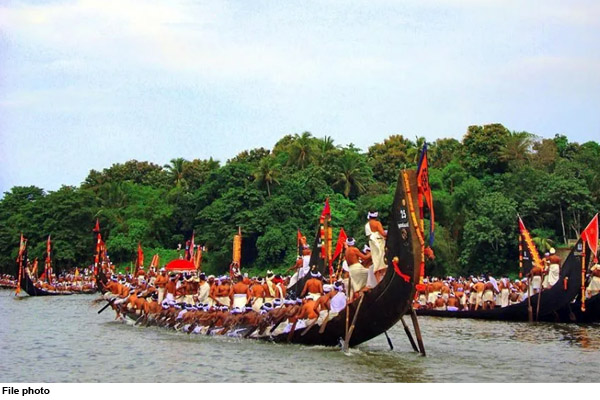Onam 2024: Onam is a major harvest festival celebrated primarily in the Indian state of Kerala. It marks the homecoming of the mythical King Mahabali and is a significant cultural event that unites people regardless of religion or background. The festival usually falls between August and September, in the Malayalam month of Chingam, and lasts for ten days.
Under the Shravana Nakshatra, Onam is celebrated on Dwadashi Tithi of Shukla Paksha in the month of Bhadrapada. The grand harvest festival is scheduled for Sunday, September 15, this year. Kolla Varsham, the start of the Malayalam calendar year, also begins on Onam.
Key Highlights of Onam
Pookalam: Intricate flower arrangements made on the ground, often in circular patterns, to welcome King Mahabali.
Onasadya: A grand vegetarian feast served on a banana leaf, with dishes like sambar, avial, thoran, and payasam.
Vallamkali (Boat Race): Snake boat races are a popular feature of Onam, especially in regions with rivers and lakes.
Cultural Performances: Traditional dance forms like Kathakali, Thiruvathirakali, Pulikali (tiger dance), and other art forms are performed during the festivities.
Mahabali Legend: The central story of Onam revolves around the benevolent King Mahabali, whose reign is believed to have been so prosperous that the gods became jealous and sent Lord Vishnu in his Vamana avatar to curb Mahabali’s influence. However, Mahabali is allowed to return to his people once a year, which is celebrated as Onam.
Significance of Onam
The significance of Onam lies in its deep cultural, religious, and social roots in Kerala, making it one of the most important festivals in the state. Here’s a breakdown of its importance:
Mythological Significance
Onam celebrates the return of the legendary King Mahabali (Maveli), a mythical ruler known for his just and prosperous reign. According to Hindu mythology, Mahabali’s reign was characterized by peace, equality, and happiness, so much so that even the gods grew envious. In response, Lord Vishnu took the form of Vamana, a dwarf Brahmin, and tricked Mahabali into giving up his kingdom. However, as a mark of his greatness and love for his people, Mahabali was granted permission to return to visit them once a year, which is commemorated as Onam.
The festival honors his visit and celebrates the idea of an ideal ruler, fairness, and the golden age of prosperity.
Harvest Festival
Onam also marks the end of the monsoon season and the beginning of the harvest. It is a celebration of nature’s bounty and the hard work of the farmers. The agricultural significance is evident through the grand feasts (Onasadya) and the overall theme of abundance and gratitude.
Cultural and Social Unity
Onam transcends religious boundaries, as it is celebrated by people of various religions in Kerala. It fosters unity and community spirit, as families, friends, and neighbors come together to celebrate. The festival is marked by communal participation, as people work together on activities like making the Pookalam (floral rangoli) or preparing an elaborate feast.
Symbol of Equality
Onam’s celebrations reflect the ideal society that existed during Mahabali’s reign—where there was no poverty or discrimination, and everyone lived happily. It symbolizes social harmony, equality, and the promise of better times, reinforcing values of fairness and justice.
Cultural Significance
Onam showcases the rich cultural heritage of Kerala through its traditional dance forms (like Kathakali and Thiruvathirakali), music, folk performances, and games. Events like the Vallamkali (snake boat race) and Pulikali (tiger dance) are some of the festival’s unique cultural displays that attract global attention.
Religious Significance
While Onam is rooted in Hindu mythology, it is not strictly a religious festival. For Hindus, it also marks the beginning of the new year in the Malayalam calendar. Temples conduct special prayers and rituals to honor Lord Vishnu in his Vamana avatar.
Joy and Prosperity
Onam is a festival of joy, signifying a time when people welcome prosperity, happiness, and abundance into their homes. It is a time for new clothes, exchanging gifts, decorating houses, and participating in communal activities, reflecting the joyous spirit of the occasion.
In essence, Onam is not just a religious or harvest festival; it’s a celebration of Kerala’s culture, heritage, and the values of equality, justice, and community. The festival symbolizes unity, equality, and joy, bringing communities together to celebrate the bountiful harvest season.

